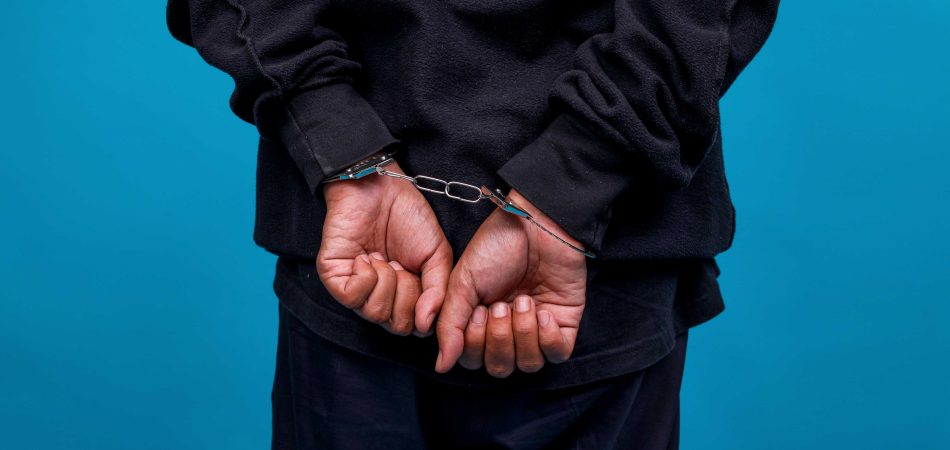
LEGAL DISCLAIMER
This article is provided for informational purposes only and does not constitute legal advice. Louisiana’s sentencing laws underwent major changes in 2024 that increased time served for most offenses.
Every case has unique circumstances that require professional legal analysis. If you have been arrested, contact a licensed Louisiana criminal defense attorney immediately to protect your rights and explore your legal options under current law.
IMPORTANT 2024 SENTENCING CHANGES NOTICE
For offenses committed on or after August 1, 2024, offenders must now serve at least 85% of their sentence (compared to as little as 35% previously), and parole has been eliminated for most crimes.

Louisiana’s criminal justice system has specific procedures and deadlines that can impact your case, and recent changes to sentencing laws have made the consequences of conviction more severe than ever before.
The stress of an arrest can cloud your judgment, but staying calm and taking the right steps can make a difference in the outcome of your case. Louisiana law provides specific protections for defendants, but these rights are only valuable if you know how to exercise them properly.
With Louisiana’s 2024 sentencing changes requiring most offenders to serve at least 85% of their sentences with no possibility of parole, understanding the arrest process and your legal options is absolutely crucial for protecting your future.
If you’ve been arrested in Lafayette, don’t face these charges alone. Contact the Ikerd Law Firm immediately at (337) 366-8994 for experienced criminal defense and personal injury representation.
The first hours after an arrest are critical for protecting your legal rights and building your defense. Taking the right steps immediately can prevent you from inadvertently damaging your case and ensure that law enforcement follows proper procedures.
Your right to remain silent is guaranteed by the Fifth Amendment to the U.S. Constitution and is one of your most powerful protections during an arrest. Law enforcement officers are required to inform you of this right, but you should exercise it immediately, even before receiving Miranda warnings.
Anything you say to police officers, detectives, or jail personnel can be used against you in court. This includes casual conversations, phone calls from jail, and statements you think might help explain your situation.
Even if you believe you are innocent or that you can talk your way out of the charges, speaking without an attorney present rarely helps and often makes cases more difficult to defend.
Police officers are trained in interrogation techniques designed to encourage suspects to provide incriminating statements. They may tell you that cooperation will help your case or that remaining silent makes you look guilty.
Once you make the request for an attorney, law enforcement must stop questioning you until your attorney is present. This is a proactive thing you must do!
Do not let officers convince you that asking for a lawyer will make you look guilty or delay your release. The Louisiana Code of Criminal Procedure protects your right to counsel, and requesting an attorney is a smart legal decision that demonstrates you understand the seriousness of the situation.
Be persistent if officers continue questioning after you have requested counsel. Repeat your request for an attorney and decline to answer any questions.
Some officers may try to engage you in “casual conversation” that is actually an interrogation in disguise. The safest approach is to remain polite but firm in your refusal to discuss the case without your lawyer present.
Law enforcement officers may ask for permission to search your vehicle, home, belongings, or person. You have the constitutional right to refuse these searches, and exercising this right cannot be used as evidence against you.
If officers have a valid search warrant, they do not need your consent and will proceed with the search regardless of your wishes. However, many searches during arrests are conducted based on consent rather than warrants.
By refusing consent, you preserve important legal challenges that your attorney can raise later if evidence was obtained improperly.
Do not physically resist if officers proceed anyway, as this could result in additional charges. Instead, let your attorney challenge any improper searches in court, where legal remedies are available.
Knowing what to expect during the arrest and booking process can help reduce anxiety and ensure you make informed decisions during this critical time.
The booking process can take several hours, especially during busy periods. You will be placed in a holding cell during this time, and the conditions can be uncomfortable.
Remember that this is temporary, and focus on making smart decisions rather than rushing to get out by saying things that could hurt your case later.

Phone calls in jail are recorded and can be used as evidence against you. Avoid discussing the details of your case, your whereabouts before the arrest, or anything that could be interpreted as an admission of guilt. Keep conversations focused on arranging bail and legal representation.
Some people make the mistake of calling multiple people to explain their situation or seek advice. This multiplies the number of potentially damaging recorded conversations. It is better to make fewer, more strategic calls focused on getting proper legal help.
In Lafayette Parish, bail amounts are determined by judges based on the severity of charges, your criminal history, your ties to the community, your ability to post bail, and the weight of evidence against you.
For most misdemeanor charges, defendants can be booked and posted bond within a few hours without requiring a formal hearing. Louisiana law requires that defendants be brought before a judge within 72 hours of arrest, and bail will be set during the arraignment hearing for felony charges and more serious offenses.
Louisiana’s Constitution says that everyone has the right to bail, but some people may not be able to get bail at all.
This includes people who are accused of capital crimes where the evidence is strong and the presumption of guilt is high, or people who are charged with violent crimes or certain drug offenses where a judge thinks there is a good chance the defendant will run away or be a danger to the community.
During bail hearings, your attorney can advocate for reasonable bail amounts or argue for release on your own recognizance.
If bail is set too high, your attorney can file a Motion for Bond Reduction to request that the court lower the amount to something you can afford. This process may require a hearing where your attorney can present evidence and question law enforcement officers about the facts of your case.
Understanding your constitutional rights is essential for protecting yourself throughout the criminal justice process. These rights apply from the moment of arrest through the conclusion of your case, and knowing how to exercise them properly can impact the outcome.
You cannot be forced to testify against yourself or provide evidence that could lead to your conviction.
This right extends beyond refusing to answer questions. You also cannot be compelled to participate in lineups if it would be testimonial in nature, provide handwriting samples in certain circumstances, or take field sobriety tests without potential consequences for refusal (though refusing breath tests can result in license suspension under Louisiana’s implied consent law).
Louisiana Constitution Article I, Section 13 guarantees the right to counsel in criminal cases, and this right applies whether you can afford an attorney or need court-appointed counsel.
The quality of your legal representation often determines the outcome of your case, making this one of your most important rights.
If you cannot afford an attorney, the court will appoint a public defender to represent you. While many public defenders are skilled attorneys, they often handle heavy caseloads that may limit the time they can devote to your case.
Hire a private counsel who can focus exclusively on your defense if you can.
Louisiana Code of Criminal Procedure Article 701 establishes specific timeframes for bringing cases to trial. For misdemeanors, the trial must commence within 30 days if you are in custody or 60 days if you are released on bond. For felonies, the timeframes are 120 days in custody or 180 days on bond.
These deadlines protect you from indefinite prosecution and ensure that evidence remains fresh and witnesses remain available. But certain circumstances can extend these deadlines, and you can waive your speedy trial rights if it can help your defense.
Louisiana courts have developed extensive case law interpreting these protections, and violations can result in evidence being excluded from your trial.
Understanding these rights helps you make informed decisions during police encounters. While you should never physically resist law enforcement, clearly stating your refusal to consent to searches preserves important legal challenges that your attorney can raise later.
The decision to hire an attorney and which attorney to choose can impact every aspect of your case.

Local attorneys also have established relationships within the legal community that can benefit your case. They know which prosecutors are reasonable in plea negotiations, which judges are strict about certain issues, and how to navigate the local court’s administrative procedures efficiently.
With the elimination of parole and increased mandatory time served, these relationships and local knowledge become even more valuable in securing favorable outcomes.
When selecting a criminal defense attorney, focus on their experience with cases similar to yours, their track record in Lafayette Parish, and their understanding of Louisiana’s 2024 sentencing changes. Look at their reviews online and the reasons previous clients give for good reviews, not just the rate of the review.
Ask about their trial experience, their approach to your specific type of case under current law, and their availability to work on your matter.
Red flags include attorneys who make unrealistic promises about outcomes, demand large retainers without explaining their fee structure, or seem unaware of the recent changes to Louisiana’s sentencing and good time laws.
The best attorneys are honest about the challenges in your case while working aggressively to achieve the best possible outcome under current law. Remember, sometimes honesty means telling you something you do not want to hear.
Louisiana Evidence Code Article 506 protects communications between attorneys and clients, allowing you to speak freely about your case without fear that your statements will be disclosed to prosecutors or law enforcement.
This privilege is essential for effective representation because it allows your attorney to understand all the facts and develop the strongest possible defense.
Be completely honest with your attorney about the facts of your case, your criminal history, and any concerns you have about the charges.
Your attorney cannot assist you if you present information that was not discussed during your consultation.

Even misdemeanor convictions can have serious long-term consequences, including difficulty finding employment, loss of professional licenses, and problems with housing applications.
Many employers conduct background checks, and a criminal record can eliminate opportunities even for minor offenses.
Louisiana felony charges include offenses like aggravated battery, burglary, drug distribution, and theft over $1,000. Penalties range from one year to life imprisonment, depending on the specific offense and your criminal history.
Felony convictions also result in temporary loss of voting rights while incarcerated (restored immediately upon release), loss of gun ownership rights for 10 years under state law (permanently under federal law), and difficulty obtaining professional licenses. These collateral consequences can affect your life long after you complete your sentence.
Louisiana’s DWI law sets the legal limit at 0.08% blood alcohol concentration for adults, 0.04% for commercial drivers, and 0.02% for drivers under 21. First offense penalties include jail time of 2 days to 6 months (with a mandatory minimum of 2 days), fines of $300 to $1,000, and license suspension.”
Prior to June 8, 2025, a first-offense OWI penalty included jail time of 10 days to 6 months, fines up to $1,000, and license suspension.
For new allegations of OWI 1st committed after June 8, 2025, the potential fine will be up to $1,025. This is more than just an increase in a potential fine.
Under Louisiana’s constitution, HB 403 (2025) increased the fine amount above the threshold to guarantee a defendant the right to a jury trial. That means, going forward, an OWI 1st or 2nd, which are misdemeanors, will give a defendant the added protection of a jury trial, and not automatically require a trial by judge.
Repeat DWI offenses carry increasingly severe penalties, including mandatory jail time, longer license suspensions, and installation of ignition interlock devices. Multiple convictions can result in felony charges and several years in prison, which under current law would require serving at least 85% of any sentence imposed.
Certain categories of offenses remain ineligible for any good time credits under both the old and new systems:
These offenders serve 100% of their imposed sentence regardless of when the offense was committed.
Understanding the court process helps you prepare for what to expect and make informed decisions at each stage of your case.
Arraignment is your first formal court appearance, where you will be informed of the charges and asked to enter a plea. Most defendants enter a plea of “not guilty” to preserve all their legal options while their attorney investigates the case and explores defense strategies.
Given the increased penalties under the current law, judges may be more cautious about release decisions.
The pre-trial phase involves motions practice, discovery review, and plea negotiations. With the elimination of parole and restriction of good-time credits, this phase has become even more critical.
Your attorney may file motions to suppress evidence obtained through illegal searches, dismiss charges based on legal deficiencies, or exclude improperly obtained confessions.
The stakes in plea negotiations have increased dramatically under the new sentencing laws. What might have been a reasonable plea agreement under the previous system?
What might have been a reasonable plea agreement under the previous system may now seem inadequate given the harsher potential penalties.
If your case proceeds to trial, you have the right to choose between a jury trial and a bench trial (trial before a judge only).
Louisiana requires unanimous jury verdicts for felony convictions following the 2020 U.S. Supreme Court decision in Ramos v. Louisiana, and your attorney will help you understand which option provides the best opportunity for success in your specific case.
During the trial, the prosecution must prove your guilt beyond a reasonable doubt. Your attorney will challenge their evidence, present alternative theories, and ensure that your constitutional rights are protected throughout the process.
With the increased consequences of conviction under the current law, thorough trial preparation becomes even more essential.
If convicted, Louisiana judges have broad discretion in sentencing within statutory limits. Your attorney can present mitigation evidence, including your personal history, community ties, employment record, and other factors that support a lenient sentence.
Criminal convictions have far-reaching consequences that extend well beyond any immediate penalties.
Understanding these collateral consequences helps you make informed decisions about your case and plan for your future, especially given the increased incarceration time under current good-time laws.
A criminal conviction becomes part of your permanent record and can affect employment opportunities, housing applications, professional licensing, and educational opportunities.
Many employers conduct background checks, and a conviction can eliminate job opportunities even if it’s unrelated to the work you’d be performing.
With Louisiana’s new sentencing requirements resulting in longer periods of incarceration, these employment and housing challenges become more severe. Extended periods away from the workforce make reintegration more difficult and can have lasting economic impacts on individuals and families.
Felony convictions carry additional consequences, including loss of voting rights while incarcerated, permanent loss of gun ownership rights, and ineligibility for certain government benefits.
These consequences apply regardless of whether you serve jail time or receive probation, but the longer incarceration periods under current law make these impacts more severe.
Louisiana’s expungement law allows certain criminal records to be cleared under specific circumstances. For felony convictions, you generally must wait 10 years after completing your sentence and have no additional convictions during that period.
Not all convictions are eligible for expungement. Violent crimes, sex offenses, and certain other serious felonies cannot be expunged regardless of how much time passes. Understanding expungement eligibility can influence decisions about plea negotiations and trial strategy.
Successfully navigating the criminal justice system requires more than just having good legal representation. Your own actions and decisions can significantly impact the outcome of your case and your future opportunities, especially given the increased stakes under current law.
Given the elimination of parole and restricted good-time credits, maintaining exemplary conduct throughout any legal proceedings becomes even more critical. Any additional charges or violations can compound an already difficult situation under current law.
Understanding available resources in Lafayette can help you navigate the system more effectively and access support services that may benefit your case or personal situation.
The Lafayette Parish Courthouse is located at 800 South Buchanan Street, Lafayette, LA 70501. The courthouse handles all felony criminal matters in Lafayette Parish and many misdemeanor cases, and understanding the layout and procedures can help reduce stress during court appearances.
Legal aid services are available to low-income individuals in the Lafayette area, though specific organizations and their criminal law services may be limited. Contact local legal aid organizations or the Louisiana State Bar Association’s LEAP program for information about available services and referrals to other resources.
Several reputable bail bondsmen serve Lafayette Parish and can help secure your release from custody. When choosing a bondsman, verify their licensing with the Louisiana Department of Insurance and understand all fees and conditions before signing any agreements. Given the increased penalties under the current law, securing release becomes even more important for case preparation.
With Louisiana’s new sentencing requirements resulting in longer periods of incarceration, families should consider accessing support services:
Do not attempt to navigate this complex and new, harsher system alone. Contact the Ikerd Law Firm immediately for experienced criminal defense representation in Lafayette.
Every day you wait is a day that could have been used to build a stronger defense against the serious consequences you now face.